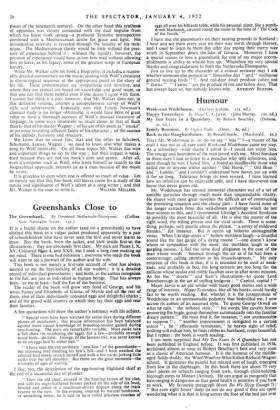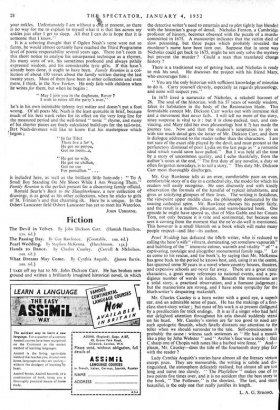Humour.
Family Reunion. By Ogden Nash. (Dent. 8s. 6d.) Back to the Slaughterhouse. By Ronald Searle. (Macdonald. 6s.)
THAT Mr. Wodehouse is—or do we say " was " ?—a master of his craft I was not at all sure until Week-end Wodehouse came my way. As a schoolboy—with shame I admit it—I could not enjoy him. The energy and heartiness of the man jarred with me. Most Sundays in those days I had to listen to a preacher who split infinitives, and, saint though he was, I hated him. .1 found as insufferable those who called me or anyone within earshot " Old Horse," " Old Bean " and " Laddie," and I couldn't understand how Jeeves put up with it for so long. Tolerance brings its own reward. I have learned how an infinitive can be enjoyable split, and I have discovered one horse that never grows old.
Mr. Wodehouse has created immortal characters out of a set of amiable parasites through mitch more than unquenchable vitality. .He shares with most great novelists the difficult art of constructing the promising situation and the classic plot : I have found none of the longer extracts from this well-chosen anthology which do not bear witness to this, and I recommend Ukridge's Accident Syndicate as possibly the most beautiful of all. He is also the master of the right word, the telling phrase and the vivid simile. There is some- thing, perhaps, very puerile about the phrase, " a covey of mildewed females," for instance. But it opens up hitherto unimaginable vistas. When Ukridge-utters a " hollow mirthless laugh—a dreadful sound like the last gargle of a dying moose "—one doesn't know whom to sympathise with the more, the mirthless laugh or the gargling moose. I feel the same dual allegiance in the case of the man whose words " boomed through the air as if he had been a costennonger calling attention to his brussels-sprouts." My only criticism of this book is that, if it is intended to be used at week- ends, and probably in bed, the long extracts are too long for the millions whose ocular and risible faculties cave in after seven minutes. As for the " shorts " and Kerr's illustrations—to quote Lord Bromborough in the act of sniffing kedgeree : " Capital, capital ! "
Major Jarvis is an old soldier with many good stories and a wide range of interests. Happy Yesterdays, like all his books, could hardly fail to be worth reading. But, whether it is the juxtapositign of Wodehouse or an unreasonable pedantry that bedevilled me, I now accuse its author of an accursed style. To quote George Orwell on what he calls " the inflated style," " his words, like cavalry horses answering the bugle, group themselves automatically into the familiar dreary pattern." He must find it, for instance, " not unreasonable to suppose " ; " another improvement is instigated to a certain extent " • he " effectually terminates," he heaves sighs of relief, nothing will induce him, he finds robberies barefaced, crops bountiful. But I repeat : the book is worth reading.
I am most surprised that My Ten Years In A Quandary has not been published in England before. It was first published in 1936, acclaimed almost at once as Robert Benchley's best and very soon as a classic of American humour. It is the humour of the middle- aged fuddy-duddy, the Woof-Woof-or-Who-Killed-Richard-Wagner school. It generates the painful but relaxed sort of laugh, emerging from low in the diaphragm. In this book there are about 75 very short pieces on subjects ranging from owls, through child-holding, hiccough cures to Mozart (Arthur). He can argue as pungently that bass-singing is dangerous as that good health is pointless if you have to work. My favourite paragraph (from .bo We Sleep Enough ?): " But even eight hours' sleep do not do any good if they are spent wondering what it is that is lying across the foot of the bed just over your ankles. Unfortunately I am without a Ng at present, so there is no way for me to explain to myself what it is that lies across my ankles just after I get to sleep. All that 1 can do is hope that it is someone that I know."
It is a sobering thought that if Ogden Nash's verse were not so funny, he would almost certainly have reached the Third Programme level of poetic respectability several years ago. There isn't room in this short notice to analyse his unsurpassed technique as a rhymer, his many sorts of wit, his sometimes profound and always pithily expressed wisdom, and his considerable lyric gifts. If this hasn't already been done, it ought to have been. Family Reunion is a col- ' lection of about 150 verses about the family written during the last twenty years. Most of them have been in other collections and even more, I think, in the New Yorker. He only fails with children when he writes for them, but when he begins : " May I join you in the doghouse, Rover ?
I wish to retire till the party's over," he's in his own inimitable (plenty try) métier and doesn't put a foot wrong. Of all poets Mr. Nash is the least quotable in brief, because much of his best work relies for its effect on the very long line for the measured period and the well-timed " -tonic " rhyme, and many of his shorter pieces are finely calculated build-ups for the tail-twist. Bu t Nash-devotees will like to know that his masterpiece which begins
" In far Tibct
There live a lar-1,
He got no poppa, Got no momi..a,
" He got no wife, He got no chillun,. Got no use For penicillun." .
is included here, as well as the brilliant little hate-ode : " To A Small Boy Standing On My Shoes While I Am Wearing Them." Family Reunion is the perfect present for a discerning family official.
Ronald Searle's Back to the Slaughterhouse, a new collection of drawings, is as good as his other collections, when he sticks to girls of St. Trinian's and that charming ilk. Here he is unique. In the Osbert Lancaster field Osbert Lancaster has yet to meet his Waterloo.
JOHN USBORNE.







































 Previous page
Previous page